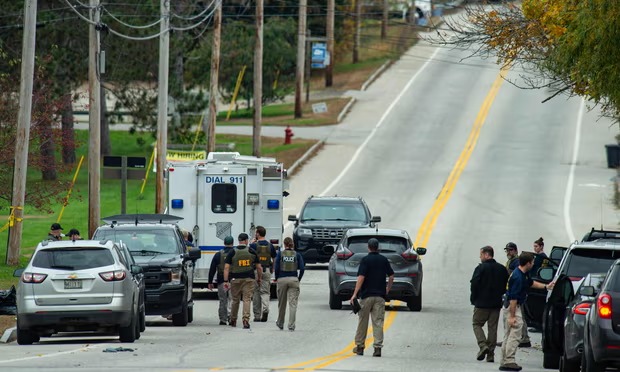In a dramatic turn of events, the suspected gunman responsible for the brutal killing of 18 people and injuring 13 others in two mass shootings in Lewiston, Maine, has been found dead, putting an end to a state-wide manhunt. Robert Card, a 40-year-old Army reservist, had been on the run after the shootings that took place at Schemengees Bar and Grille and Just-In-Time Recreation bowling alley. Law enforcement officials believe he took his own life, as his lifeless body was discovered in the woods near the town of Lisbon. The shocking conclusion of this ordeal has left the community and state grappling with the aftermath.
Robert Card’s Body Discovered in Wooded Area Near Lisbon
The apprehension of Robert Card brought relief to the communities of Lewiston and Lisbon, as the fugitive’s body was located near a recycling center in Lisbon, not far from where he had abandoned his car. Card had reportedly taken his own life with a self-inflicted gunshot wound behind a dumpster, a discovery that followed extensive search efforts in the area. The news of Card’s demise marked a turning point, allowing residents to emerge from their homes after days of living in fear.
Mental Health Concerns Arise in the Aftermath of Shootings
Amid the manhunt for Card, questions arose concerning his mental health history. Authorities disclosed that Card had previously been taken into custody for evaluation due to erratic behavior in mid-July. The US official informed that his alarming conduct led military officials to summon law enforcement, resulting in his evaluation at the Keller Army Community Hospital in West Point, New York. The revelation about Card’s mental health history has shed light on the complexity of the situation and underscores the importance of addressing mental health concerns.
Community Breathes Sigh of Relief as Lewiston Begins Healing
Following the news of Card’s demise, Maine Governor Janet Mills expressed her relief during a late-night press conference. She conveyed, “I’m breathing a sigh of relief in knowing that Robert Card is no longer a threat to anyone. Tonight, the city of Lewiston and the state of Maine can begin to move forward on the long road of healing.” The Commissioner of Public Safety, Michael Sauschuck, affirmed that Card’s body was discovered along the banks of the Androscoggin River, providing closure to a community that had been paralyzed by fear.
Local residents, like 17-year-old Noah Caron, are beginning to feel the weight lift. “It was good to see how the community came together and kept everyone close,” he said, reflecting on the challenging times the community endured. Lisbon Police Chief Ryan McGee echoed this sentiment, highlighting the unity and resilience of the community during the crisis.
Monica, a local resident whose husband’s truck had been inaccessible near the waste station during the manhunt, said, “It’s been dark and scary. Now the light can begin to come back through.” The resolution of this harrowing chapter brings a sense of relief to the people of Lewiston and Lisbon, allowing them to start the process of healing and moving forward.
The conclusion of the manhunt marks a significant turning point in the devastating Maine shootings case, offering some closure to the victims’ families and a chance for the affected communities to rebuild. Mental health concerns surrounding the suspect underscore the importance of addressing such issues within society, even in the wake of such tragedies. As Lewiston and Lisbon gradually regain their sense of security, they can now begin the long and challenging journey toward healing and recovery.
















